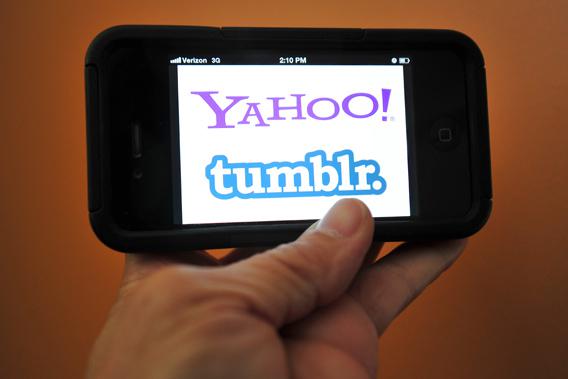The news of Yahoo’s acquisition of Tumblr launched many an irritated post on the microblogging site this week; the response is similar to Instagram users’ histrionic reactions after Facebook bought the photo-sharing company last year. The price tag for the free microblogging site is reportedly $1.1 billion. Is Tumblr really worth more than $1 billion?
It’s hard to say. In most cases, the acquirer of a company will base its offer price on the projected increase in earnings per share that it expects to get out of the deal. In this case, Yahoo has little basis for such a projection because Tumblr is a free service, so the best it can do is estimate the worth of the site’s user base. It’s difficult to calculate Tumblr’s potential ad revenue because until recently it ran no advertisements. But there are three ways to measure Tumblr’s value for advertisers: how many people use Tumblr, how often they use the site, and how long they stay on the site. Over the past year, Tumblr has doubled its number of unique visitors. The site’s minimalist style is “sticky,” encouraging users to continually scroll down the home page loading posts from the blogs they follow; the site has more than 100 million blogs in all. But the real draw for Tumblr is its user demographic. According to Quantcast, Tumblr attracts a higher proportion of 18- to 24-year-olds among its users than do Twitter, Facebook, or YouTube.
The microblogging platform only recently started hosting paid content on its home dashboard, generating $13 million in revenue in 2012. It may seem ridiculous to acquire a company with such paltry revenues, but Yahoo is playing the long game in the hope that its acquisition of Tumblr will attract a younger audience and the ad dollars that come with them. As Ken Goldman, Yahoo’s chief financial officer, said recently at a conference, Yahoo needs to be “cool again.” Gaining Tumblr’s young audience will help Yahoo’s brand, and it will allow the company to sell data on a coveted demographic to advertisers. Sometimes companies acquire other firms because they can, and sometimes they do so because they need to. This acquisition seems to fall into the latter category—Yahoo’s “portal” model of directing users to stories from the site’s home page is declining as more people get their news through social media.
In the past, Yahoo has become the final resting place for seemingly promising sites it has acquired, including del.icio.us, broadcast.com, and Geocities, all of which floundered after Yahoo acquired them. Flickr, another Yahoo acquisition, seems to be going the same way with the rise of Instagram. If Yahoo is able to maintain the community Tumblr has created while slowly incorporating more advertising, its $1 billion gamble could pay off. But whether Yahoo has learned from its past mistakes is yet to be seen.
Got a question about today’s news? Ask the Explainer.
Explainer thanks Puneet Manchanda and Erik Gordon of the University of Michigan Ross School of Business and Matthew Rhodes-Kropf of Harvard Business School.
